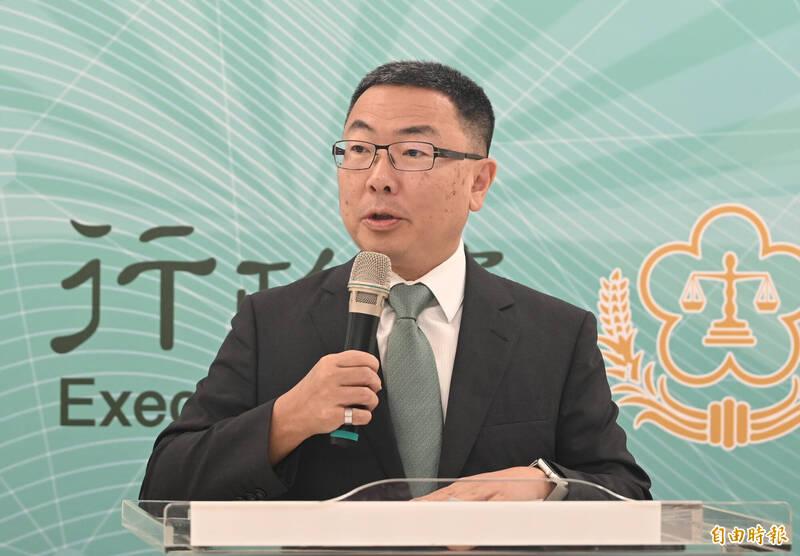The Constitution already allows for restrictions on free speech, Minister Without Portfolio Lin Min-hsin (林明昕) said today at a news conference after a Chinese-born resident left Taiwan earlier this week after her residence permit was revoked due to her alleged support of Chinese unification by force.
Article 23 of the Constitution states that all enumerated freedoms and rights “shall not be restricted by law except by such as may be necessary to prevent infringement upon the freedoms of other persons, to avert an imminent crisis, to maintain social order or to advance public welfare.”
The statement comes after Chinese-born social media influencer “Yaya in Taiwan” (亞亞在台灣), left for China on Tuesday, hours before the government could execute a deportation order issued for her “reunification” comments made on Chinese short-video platform Douyin.

Photo: Taipei Times
The National Immigration Agency earlier this month revoked Yaya’s, whose real name is Liu Zhenya (劉振亞) and is married to a Taiwanese, dependent-based residency permit and barred her from reapplying for five years before issuing an order to leave Taiwan before midnight on Tuesday.
The situation stoked debate about what constitutes free speech and what can be deemed illegal speech which incites hatred or violence.
Citizens’ rights, including the right to free speech, are protected under the law, but everyone lives in a collectivist society, not one which protects only the rights of the individual, Lin said.
The extent to which free speech may be subject to limitations depends on the specific circumstances and timing, but restrictions can be enforced as long as they align with the principles of legal reservations, legal certainty and legitimate purpose, all of which have room for debate, he added.
Limits placed on free speech must not only satisfy constitutional interpretations but meet international legal standards, including the UN’s two covenants — the International Covenant on Civil and Political Rights and the International Covenant on Economic, Social and Cultural Rights, he said.
If the Criminal Code is used to regulate free speech, it must meet the principle of legality and be defined by law as a punishable offense, he added.
If free speech is deemed to create a risk to national security, it may warrant criminal punishment or other reasonable sanctions, he said.
In the future, specific articles may be introduced to the Criminal Code or a separate law may be enacted to deal with such instances, he said.
The decision would be considered by the Ministry of Justice which would set up a taskforce to evaluate amendments to the Criminal Code, he added.
The Executive Yuan would respect the jurisdiction of the different ministries and evaluate the scope and necessity of placing restrictions on free speech, particularly concerning criminal penalties, he said.
Implementing the Criminal Code in such cases would only be used as a last resort, he added.
Premier Cho Jung-tai (卓榮泰) has said that free speech is not without limits, and once it threatens national security, even democratic countries may impose restrictions, Cabinet spokesperson Michelle Lee (李慧芝) said.

The manufacture of the remaining 28 M1A2T Abrams tanks Taiwan purchased from the US has recently been completed, and they are expected to be delivered within the next one to two months, a source said yesterday. The Ministry of National Defense is arranging cargo ships to transport the tanks to Taiwan as soon as possible, said the source, who is familiar with the matter. The estimated arrival time ranges from late this month to early next month, the source said. The 28 Abrams tanks make up the third and final batch of a total of 108 tanks, valued at about NT$40.5 billion

Two Taiwanese prosecutors were questioned by Chinese security personnel at their hotel during a trip to China’s Henan Province this month, the Mainland Affairs Council (MAC) said yesterday. The officers had personal information on the prosecutors, including “when they were assigned to their posts, their work locations and job titles,” MAC Deputy Minister and spokesman Liang Wen-chieh (梁文傑) said. On top of asking about their agencies and positions, the officers also questioned the prosecutors about the Cross-Strait Joint Crime-Fighting and Judicial Mutual Assistance Agreement, a pact that serves as the framework for Taiwan-China cooperation on combating crime and providing judicial assistance, Liang

A group from the Taiwanese Designers in Australia association yesterday represented Taiwan at the Midsumma Pride March in Melbourne. The march, held in the St. Kilda suburb, is the city’s largest LGBTQIA+ parade and the flagship event of the annual Midsumma Festival. It attracted more than 45,000 spectators who supported the 400 groups and 10,000 marchers that participated this year, the association said. Taiwanese Designers said they organized a team to march for Taiwan this year, joining politicians, government agencies, professionals and community organizations in showing support for LGBTQIA+ people and diverse communities. As the first country in Asia to legalize same-sex

MOTIVES QUESTIONED The PLA considers Xi’s policies toward Taiwan to be driven by personal considerations rather than military assessment, the Epoch Times reports Chinese President Xi Jinping’s (習近平) latest purge of the Chinese People’s Liberation Army (PLA) leadership might have been prompted by the military’s opposition to plans of invading Taiwan, the Epoch Times said. The Chinese military opposes waging war against Taiwan by a large consensus, putting it at odds with Xi’s vision, the Falun Gong-affiliated daily said in a report on Thursday, citing anonymous sources with insight into the PLA’s inner workings. The opposition is not the opinion of a few generals, but a widely shared view among the PLA cadre, the Epoch Times cited them as saying. “Chinese forces know full well that